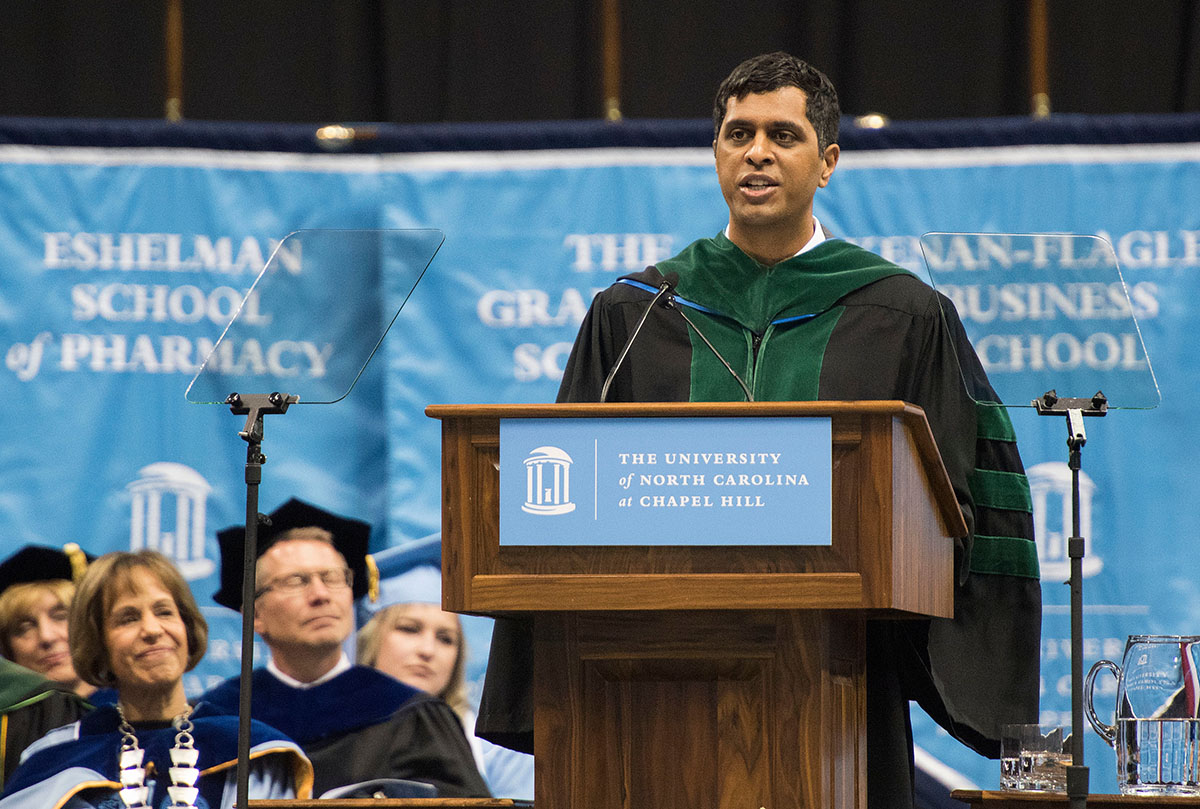- Membership
- Perks and Discounts
- Things To Do
- Resources
- News
- About
- Shop
Related Content
Stevenson: Go Where People Suffer, Struggle, Are Marginalized
June 1, 2023
In a speech that drew frequent and heavy applause, renowned social justice advocate and attorney...
Read MoreHuman Rights Activist Stevenson to Deliver Commencement Address
Dec. 19, 2022
Bryan Stevenson, executive director of the Equal Justice Initiative, a human rights organization, will deliver...
Read MoreEnglish Professor Wallace to Give Winter Commencement Address
Nov. 11, 2022
Novelist, essayist and illustrator Daniel Wallace ’08 will speak to graduates at Carolina’s Winter Commencement....
Read More-
2024
-
2023
-
2022
-
2021
-
2020
-
2019
-
2018
-
2017
-
2016
-
2015
-
2014
-
2013
-
2012
-
2011
-
2010
-
2009
-
2008
-
2007
-
2006
-
2005
-
2004
- Academics and Athletics
- Admissions
- Alumni Profiles
- Alumni Recognition
- Around Town
- Arts
- Books
- Campus Profile
- Campus Safety
- Carolina Alumni Awards
- Carolina Alumni Leadership
- Carolina Alumni Programs and Outreach
- Carolina Alumni Reunions
- Carolina Alumni Review
- Celebrations
- Championships
- College and Costs
- Commencement
- Coronavirus
- Discovery
- Extracurricular
- Faculty
- Faculty Awards
- For the People
- Go Heels
- Greek Life
- Hark the Sounds
- Higher Education
- Homecoming
- In Class
- In Memoriam
- Innovation and Technology
- Issues
- Object Lesson
- On View
- Our Treescape
- Philanthropy
- Podcast
- Public Service
- Race and Reckoning
- Research
- Sexual Assault
- Silent Sam
- Sports
- Structures
- Student Achievement
- Students
- Timelines
- Tuition and Financial Aid
- UNC Libraries
- UNC’s History
- Undergraduate Spotlight
- University Achievements
- University Awards
- University Budget Issues
- University Development
- University Leadership
- University News
- University Rankings
- What We Do
- Who We Are
- Young Alumni
- Yours at Carolina
Malawi Researcher to December Grads: Be Audacious, Not Flashy
Posted on Dec. 21, 2017
More than 1,100 students received degrees at Winter Commencement. (UNC photo/Jon Gardiner ’98)
Be audacious in your pursuits, but not in a flashy, shallow way, a faculty member whose research is on the forefront of cancer treatment in Malawi, Africa, told Carolina’s newest alumni this month.
“Undergird your audacity with equal commitment to incrementalness,” Dr. Satish Gopal ’97 told graduates at Winter Commencement, held at the Dean Smith Center on Dec. 17. “To be bold, but also boring, and to painstakingly do the daily reading and thinking and experimenting and measuring and reevaluating when absolutely no one is watching or paying attention, without which big, bold solutions to big, bold problems simply can’t be actualized.”
Gopal, who also earned his master’s in public health from UNC in 2000, is director of the cancer program at UNC Project-Malawi; he received his medical degree from Duke. His selection as speaker continued the tradition of having a Carolina faculty member deliver the Winter Commencement address.

Dr. Satish Gopal ’97, cancer program director for UNC Project-Malawi, delivered the Commencement address. (UNC photo/Jon Gardiner ’98)
More than 1,100 students received degrees this month: 491 undergraduates, 567 master’s degree students, 99 doctoral students and nine professional students.
In her opening remarks, Chancellor Carol L. Folt shared inspirational stories and remarks from two Nobel Prize winners — Albert Einstein and Oliver Smithies, the University’s first full-time faculty member to win a Nobel and a world-renowned giant in the field of gene targeting, who died in January 2017 — inventors Orville and Wilbur Wright; and Preston Dobbins ’69, who helped found Carolina’s Black Student Movement 50 years ago and “helped us create a more diverse, inclusive place.”
Like these people, Folt told the graduates, “wonder and creativity, grit and determination, never giving up and believing in yourself will propel you forward throughout your lives.”
In Lilongwe, Malawi, where it was 9 p.m., a livestream presentation of the ceremony connected the Smith Center and UNC Project-Malawi.
“Friends and colleagues at our UNC program in Malawi are watching this on the livestream as we speak — 8,000 miles and seven time zones away — which is important simply as testament to the amazing interconnectedness and reach of the global UNC family,” said Gopal, who also is an oncologist and infectious disease physician.
“In Malawi, we have opportunities to exhaustively study cancers that occur rarely in North Carolina, to uncover fundamental biologic insights about why cancer occurs and to think about entirely new ways to diagnose and treat cancer that could benefit the entire world if successful,” Gopal said.
“I feel completely humbled by how important my UNC institutional family has been,” he said, “providing an unconditionally supportive tether, which has given me confidence to wander all around the world doing random things.”
© 2024 Carolina Alumni
